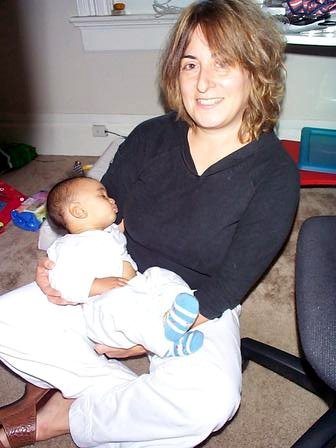On the Path to the Pachyderms -- Gao, Mali 2001
Our elephant guide Amadou is tall, dark, elegant, and speaks only French. He smokes in great kinetic waves of his arm, and chats animatedly to our driver. Large aviator sunglasses with a pink-and-black gradient cover Amadou's lined eyes. He has been leading people to the desert elephants in Mali for as long as he can remember, and seems as excited today (January 2001) as if it were his first time.
It will be indeed exciting, and lucky, for us to sight any elephants today.
As recently as the late 70's, thousands of elephants still roamed in West Africa, but now, due to the spread of desert and humans, it is rare to find a group of more than 100 in a particular area. This group of 350 elephants remaining in this harsh landscape, the Gourma region, are the largest tribe left. Their migration path of 450 kilometers (280 miles) which spans Mali, Burkina Faso, and Niger, is larger than any other elephants, and they must be able to pinpoint where to find their next source of water, or they would not survive. This most northern group of elephants are expert at finding available water sources and can actually hear rain from a great distance. They live harmoniously with the local nomadic populations of Fulani and Tuaregs, who follow the elephants to find water themselves. Recent research has proven the Gourma elephants to be a genetically distinct group, who have specifically evolved to survive a tough environment.
Kate and I sit in the back seat, our rear ends acting as shock absorbers. I wish I had taken my high school French class more seriously, but find hypnotizing the haze of smoke and trilled syllables that I can almost, but not quite, understand. As we turn right from the main road of Gao onto a muddy, rutted track, we are not quite sure where we were going, or how long it will take.
But we are thrilled to have made it this far, to the edge of the Sahara, on our way (we hope) to find the Sahelian elephants we have been seeking.
It will be indeed exciting, and lucky, for us to sight any elephants today.
As recently as the late 70's, thousands of elephants still roamed in West Africa, but now, due to the spread of desert and humans, it is rare to find a group of more than 100 in a particular area. This group of 350 elephants remaining in this harsh landscape, the Gourma region, are the largest tribe left. Their migration path of 450 kilometers (280 miles) which spans Mali, Burkina Faso, and Niger, is larger than any other elephants, and they must be able to pinpoint where to find their next source of water, or they would not survive. This most northern group of elephants are expert at finding available water sources and can actually hear rain from a great distance. They live harmoniously with the local nomadic populations of Fulani and Tuaregs, who follow the elephants to find water themselves. Recent research has proven the Gourma elephants to be a genetically distinct group, who have specifically evolved to survive a tough environment.
Kate and I sit in the back seat, our rear ends acting as shock absorbers. I wish I had taken my high school French class more seriously, but find hypnotizing the haze of smoke and trilled syllables that I can almost, but not quite, understand. As we turn right from the main road of Gao onto a muddy, rutted track, we are not quite sure where we were going, or how long it will take.
But we are thrilled to have made it this far, to the edge of the Sahara, on our way (we hope) to find the Sahelian elephants we have been seeking.


0 Comments:
Post a Comment
<< Home